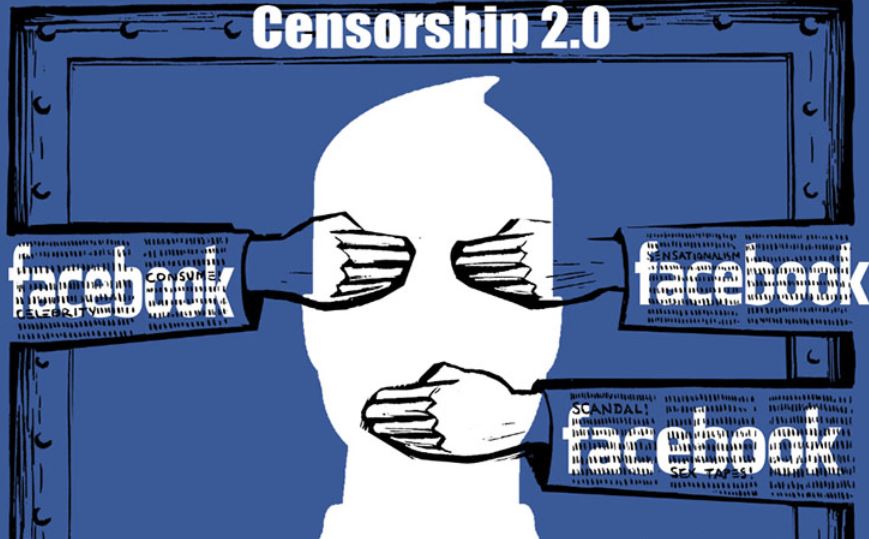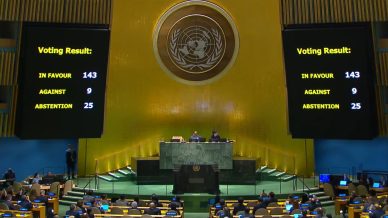A new report from a Palestinian rights organisation has found that the number of incidents in which people – including many journalists – have been arrested for social media posts has drastically increased in the last year leading to worries over an Israeli crackdown on the right to freedom of expression.
“Social media sites are… an efficient window to empower journalists and Palestinians in general to express their opinions freely” Mousa Rimawi author of the report and Director of the Palestinian Centre for Development and Media Freedoms (Mada) said.
“[But] systematic surveillance and observation by Israeli Occupation Authorities [means they have become] an open platform for persecution and oppression relating to users’ opinions.”
While there is no legal precedent in Israeli law for charging people with criminal offenses related to online posts the state worried that inflammatory content online has fuelled a spike in Israeli-Palestinian violence in the last 12 months created a cybercrime unit in October 2015 to monitor and control what is published on the internet.
In addition Israeli authorities are also pressuring social media companies to do more to remove posts which could incite violence including drafting laws – which digital rights groups say would be unworkable – to compel platforms to take down content that could incite violence.
A delegation from Facebook met with government officials in September for what were were described as “successful” talks by Interior Minister Gilad Erdan’s office. “Online extremism can only be tackled with a strong partnership between policymakers civil society academia and companies and this is true everywhere” a representative for Facebook said adding that the company meets with governments all over the world to combat hate speech and incitement to violence.
This week the activist collective Palestinian Information Centre (Pic) reported that at least 10 of their administrators’ accounts for their Arabic and English Facebook pages – followed by more than two million people – have been suspended seven of them permanently which they say is a result of new measures put in place in the wake of Facebook’s meeting with Israel.
Facebook gave no explanation why other than that members had violated Facebook’s ‘Community Standards’ Pic member Rami Salaam told The Independent. The move was about “preventing our voice from reaching out to the world” rather than incitement he said.
One video Mr Salaam said was taken down of a college graduate in Gaza starting a small business was removed because it contained nudity – even though it didn’t. “Seemingly the video was reported by Israelis and Facebook did not even bother to check” he added. A representative from Facebook told The Independent it was looking into the claims made by Pic.
“We care about the voices opinion and rights of all the different communities on Facebook” he added. “Palestinian voices will be as safe on Facebook as every other community on our platform.”
A 2015 report found that 96 per cent of Palestinians said their primary use of Facebook was for following news. Mada says that this shows the extreme importance of social media platforms and thus the potential impact disabling activists’ and journalists’ accounts could have for the dissemination of information relevent to Palestinian interests.
Since last October at least 150 arrests have been made on charges of ‘incitement’ but Palestinians and digital rights monitors say that in many cases posts are not relevant or critical of Israeli government policy rather than direct calls to violence.
Since 2014 61 Palestinian journalists and nine Israeli journalists have been prosecuted for online posts the new report from Mada found.
In August five journalists at Hebron start-up Sanabel Radio were also arrested in a dawn raid during what an Israeli army spokesperson said was an “ongoing effort against incitement.”
Last month several senior journalists from Shehab and Quds news agencies in the West Bank reported their Facebook accounts – used to update professional pages which reach millions of people – had been temporarily suspended in a move Facebook later said had been an error.
Facebook ‘likes’ and ‘shares’ have also been submitted as evidence in military trials for incitement West Bank legal charity Addameer told The Independent as was reported in the sentencing of a Palestinian astrophysics professor supportive of militant group Hamas earlier this month.
“Prosecutors use the numbers of ‘likes’ and ‘shares’ of specified posts while failing to connect these posts or these individuals to acts of violence. The trend is an alarming one” Addameer director Sahar Francis told The Independent at the time. The Israeli Defence Force did not immediately respond to a request for comment.
Many Palestinians have called for boycotts of the company for perceived collusion with the Israeli authorities and worries over the fact Facebook activity could be used to target activists.
Mr Salaam of Pic said that Facebook was too important a platform for the group to leave.
“While we feel frustrated and distracted we’re more determined to continue our activism for Palestine… We utilise all available platforms even those trying to silence us to make sure Palestine’s voice is heard loud and clear” he said.














